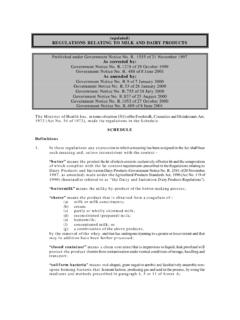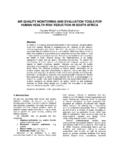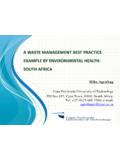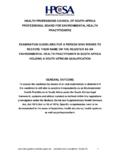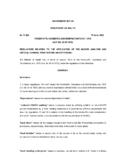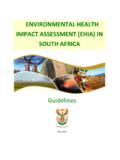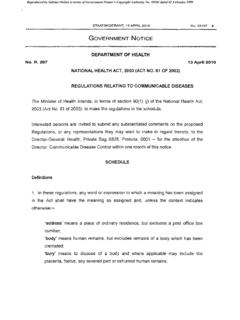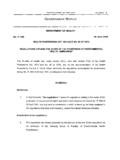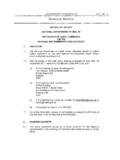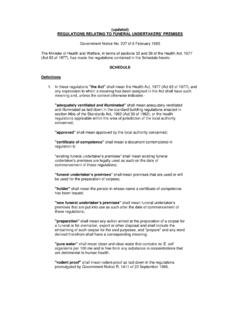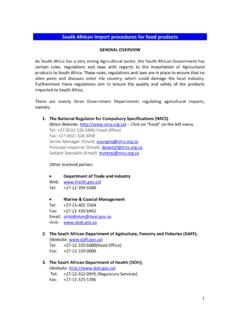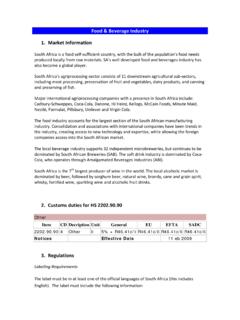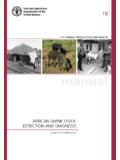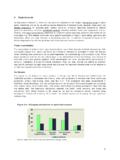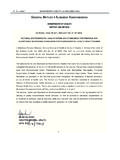Transcription of POLICY GUIDELINES: NATIONAL FOOD SAFETY ALERTS AND ...
1 DEPARTMENT OF HEALTH. Republic of south Africa POLICY guidelines : NATIONAL food SAFETY ALERTS AND. OFFICIAL food product RECALLS. IN. south AFRICA. June 2004. CONTENTS. TI TTLE PAGE. Background . 3. Definitions . 4. Introduction and aim 5. Conceptual clarification . 6. food SAFETY ALERTS 6. food product recalls 7. food control authorities .. 8. Mechanisms of a NATIONAL food SAFETY ALERTS and food product recalls .. 11. NATIONAL food SAFETY ALERTS . 12. Voluntary and official food product recalls 12. Procedures during an official food product recall 13. Procedural arrangements and responsibilities 18. Department of Health . 19. S outh African Bureau of S tandards .. 21. Conclusion .. 22. Annexes . 23. 2. 1. BACKGROUND. Recently south Africa has experienced incidents where certain food products had to be recalled on a NATIONAL scale. One was an incident that occurred in February 2002 in the Gauteng Province, where two children died from botulism after consuming contents of a tin of canned pilchards in tomato.
2 This incident resulted in a nationwide food SAFETY alert and a call to withdraw all tins of pilchards in tomato, which had the same batch number as the implicated tin. Further investigation revealed that this was not a general foodborne outbreak but an isolated case, where children from a needy family consumed the contents of a badly rusted and damaged tin of pilchards in tomato, which was received by the family as donation. The incident itself revealed several shortcomings, in the food control system, which could have resulted in a more severe situation should this have been a nationwide foodborne disease outbreak. As a result several recommendations were made to the Department of Health, one of which being the need to streamline coordination between the departments and components involved in food control as well as disease prevention and control so as to be better prepared for foodborne disease outbreaks of a NATIONAL (and even international) magnitude.
3 Hence, the decision was taken to develop POLICY guidelines on NATIONAL food SAFETY ALERTS and Official product Recalls. 3. 2. DEFINITIONS. Consignment of foodstuffs refers to a specific batch/lot of foodstuffs as specified on the relevant export documentation of the exporter and which can be identified by the certifying officer for inspection/sampling purposes, depending on the nature of the certification as determined by the importing country. food control means a mandatory, regulatory activity of enforcement by the competent health authority to provide consumer protection and ensure that all food during production, handling, storage, processing and distribution is safe, wholesome and fit for human consumption; conform to SAFETY requirements and are honestly and accurately labelled as prescribed by law. food SAFETY refers to the assurance that food will not cause harm to the consumer when it is prepared and/or eaten according to its intended use.
4 Hazard means a biological, chemical or physical agent in, or condition of, food with the potential to cause an adverse health effect. Risk refers to a function of the probability of an adverse health effect and the severity of that effect, consequential to a hazards(s) in food . 4. 3. INTRODUCTION AND AIM. A NATIONAL food SAFETY alert refers to steps taken by the NATIONAL health authority aimed at informing consumers of a potential or real health risk deriving from a specific foodstuff, which could still be available at food outlets or in the homes of consumers. It is further intended to raise awareness with the relevant health authorities responsible for the control of the foodstuff concerned. Such a food SAFETY alert may, in some instances, be followed by a food product recall, which is conducted to protect public health and SAFETY . Thus, the main objective of any recall is to effectively and efficiently remove from the market any food product that is unsafe for human consumption.
5 There is no legislation in south Africa that directly forces any food business to initiate and conduct an industry/trade food recall. In addition, it is not mandatory for any food business to have a recall plan in place. All recalls by the food industry are initiated voluntarily in the interest of public SAFETY . However, section 2(1) of the Foodstuffs Cosmetics and Disinfectants Act, 1972 (Act No. 54 of 1972) prevents any person from selling food that is unfit for human consumption. In addition, the Codex Code of Ethics for International Trade in food (see Annex A) states that all consumers are entitled to safe, sound and wholesome food and to be protected from unfair trade practices. Thus, by implication,. this code of ethics also prohibits any person to put into international trade any food that is unfit for human consumption. Although the regulations relating to inspections and investigations (R 1128 of M ay 1991), as promulgated under the Health Act, 1977 (Act 63 of 1977), make provision for Environmental Health Practitioners (EHPs) to detain, sample and if necessary seize any foodstuff, in their areas of jurisdiction, which is deemed harmful or injurious to human health, there is currently no NATIONAL POLICY in place that refers to an official food product recall.
6 As a result, it has become difficult for food control authorities to execute, monitor and record any official food product recalls that may need to be conducted in south Africa. 5. It has also been difficult to monitor and record any voluntary food product recalls instituted by industry. The aim of these POLICY guidelines is thus to provide guidance on the roles and responsibilities of industry, but particularly, food control authorities, regarding NATIONAL food SAFETY ALERTS and official food product recalls, and how these should be conducted to ensure public SAFETY . These POLICY guidelines also provide a framework on which the Directorate: food Control of the Department of Health can keep a record and develop a database of official, as well as voluntary food product recalls being conducted in the country in the interest of public health. Only records of Class I and Class II food product recalls will be kept by the Directorate: food Control.
7 4. CONCEPTUAL CLARIFICATION. food S AFETY ALERTS . Industry may voluntarily issue a food SAFETY alert , requesting consumers/customers to return the implicated food product to retailers and/or to the business concerned, or to dispose of it as it is not fit for human consumption. In this case, the consumers/customers are usually refunded for the products they return. For the purposes of these guidelines , this will be referred to as a voluntary food SAFETY alert . In other instances, for example where industry fails to issue a food SAFETY alert , the NATIONAL health authority may issue an official food SAFETY alert , whereby provincial and municipal health authorities, and, in some cases the public, are informed of a risk associated with a particular foodstuff. Provincial and municipal authorities are usually informed in writing by the Department of Health, Directorate: food Control, while a media release, by the Communications Unit of the Department of Health, is used to inform the public.
8 In most cases an official food SAFETY alert is followed by an official food product recall. 6. food product RECALLS. A food product recall can be conducted voluntarily by industry and is therefore referred to as a voluntary recall. All food businesses ( manufacturers, distributors, wholesalers, retailers, etc) share the responsibility of ensuring that the public in south Africa is protected from products that present a risk to health or gross deception, or are otherwise defective. Thus they have a moral obligation to recall any food products that have been released into the market that they know may pose a health risk to the consumers. Universally, it is recognised that there are essentially three types of food product recalls: Class I recall, involving a health hazard situation where there is a reasonable probability that eating the food will cause health problems or death. Class II recall, involving a potential health hazard situation where there is a remote probability of adverse health consequences from eating the food .
9 Class III recall, involving a situation where eating the food will not cause adverse health consequences. Class III recalls fall outside the scope of these POLICY guidelines and will not be considered henceforth. Thus, henceforth, food product recalls referred to in this document refer to Class I and Class II food product recalls only. food product recalls can also be classified as either a trade/industry recall or a consumer recall. A trade/industry recall involves recovery of the product from distribution centres and wholesalers, as well as from production premises, hospitals, restaurants, and other major catering establishments, as well as outlets that sell food manufactured for immediate consumption. A consumer recall involves recovery of the product from all points in the production and distribution network, including consumers. This is a more extensive recall. In those situations where industry fails to voluntarily conduct a food product recall, and food control authorities conduct the recall, this will be regarded as an official food products recall.
10 7. food CONTROL AUTHORITIES. Roles and responsibilities In south Africa food control is shared between several authorities and various components, within the health sector, at NATIONAL , provincial and local level. A brief outline of the roles and responsibilities of the different authorities is as follows: (a) The NATIONAL Department of Health: The Directorate: food Control administers food legislation on behalf of the M inister of Health. It is thus responsible for: Coordinating activities, such as food product recalls, within the country Setting NATIONAL norms and standards Supporting provinces and local authorities Assuming the role of the NATIONAL Codex Contact Point (b) Provincial Department of Health: Sections responsible for, amongst others, food control at provincial level are referred to as Environmental Health Services. They are responsible for: Coordinating activities within the province Providing support to the local authorities Rendering specialised services ( import control, which is done on behalf of the NATIONAL Department of Health).
